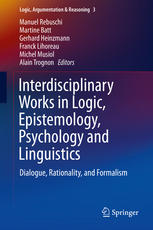

Most ebook files are in PDF format, so you can easily read them using various software such as Foxit Reader or directly on the Google Chrome browser.
Some ebook files are released by publishers in other formats such as .awz, .mobi, .epub, .fb2, etc. You may need to install specific software to read these formats on mobile/PC, such as Calibre.
Please read the tutorial at this link: https://ebookbell.com/faq
We offer FREE conversion to the popular formats you request; however, this may take some time. Therefore, right after payment, please email us, and we will try to provide the service as quickly as possible.
For some exceptional file formats or broken links (if any), please refrain from opening any disputes. Instead, email us first, and we will try to assist within a maximum of 6 hours.
EbookBell Team

4.1
80 reviewsThis book presents comparisons of recent accounts in the formalization of natural language (dynamic logics and formal semantics) with informal conceptions of interaction (dialogue, natural logic and attribution of rationality) that have been developed in both psychology and epistemology. There are four parts which explore: historical and systematic studies; the formalization of context in epistemology; the formalization of reasoning in interactive contexts in psychology; the formalization of pathological conversations.
Part one discusses the Erlangen School, which proposed a logical analysis of science as well as an operational reconstruction of psychological concepts. These first chapters provide epistemological and psychological insights into a conceptual reassessment of rational reconstruction from a pragmatic point of view.
The second focus is on formal epistemology, where there has recently been a vigorous contribution from experts in epistemic and doxatic logics and an attempt to account for a more realistic, cognitively plausible conception of knowledge.
The third part of this book examines the meeting point between logic and the human and social sciences and the fourth part focuses on research at the intersection between linguistics and psychology.
Internationally renowned scholars have contributed to this volume, building on the findings and themes relevant to an interdisciplinary scientific project called DiaRaFor (“Dialogue, Rationality, Formalisms”) which was hosted by the MSH Lorraine (Lorraine Institute for Social Sciences and Humanities) from 2007 to 2011.